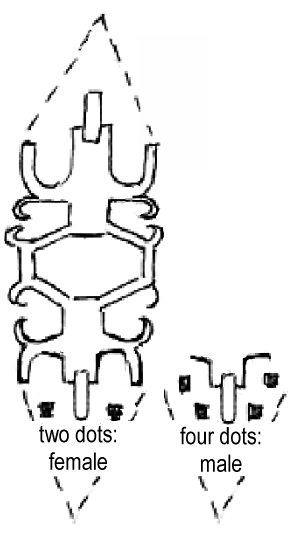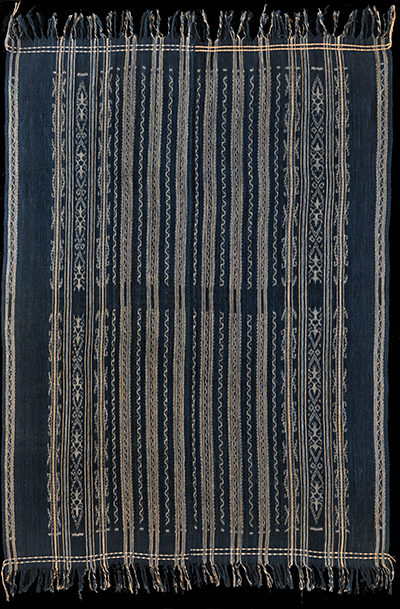| |
204 Moluccas, Tanimbar
Shoulder cloth 
|
|
| Period: | First quarter 20th c. |
| Yarn: | Cotton, hand-spun, medium |
| Technique: | Warp ikat |
| Panels: | 2 |
| Size: | 101 x 137 cm (3' 3" x 4' 5") LW: 1.36 |
| Weight: | 310 g (10.9 oz), 224 g/m2 (0.73 oz/ft2) |
| Design: | Principal motif is probably anthropomorphic, a combination of male and female figures. Van Vuuren suggest that the two dots at the head of one type represent a woman's comb, whereas the four dots at the head of the other type likely represents the male's multi-element hairdo. The narrow stripes are all decorated with snake motifs. Remarkable asymmetry: the seven clear snakes running in the midfield are unevenly divided: there are three on the left, four on the right. |
| Comment: | Probably a lady's ceremonial breast cloth, shal. Cloth has a well-used feel and has probably thinned a little but is in immaculate condition. Colours are strong, and the quality of the ikat work is at the zenith of the Tanimbar group's bell jar. Note that asymmetry is not very common in the area, but often, respectively nearly always used for men's cloths on Savu, Ndao, Roti and the Ambenu exclave of Timor-Leste. It is also occasionally used on old men's cloth from Kisar such as PC 200. It is not known what asymmetry stands for on Tanimbar. |
| Background: | Chapters on Moluccas and Tanimbar. |
| Exhibited: | Hong Kong University Museum and Art Gallery, 2017. |
| Published: | Ikat Textiles of the Indonesian Archipelago, 2018.
|
| Compare: | 265 266 269 |
| Sources: | Similar to man's undated shoulder cloth from Selaru in Khan Majlis, Woven Messages, Fig. 321. Identical division of the field but with more elaborate patterning in our example. Also similar to shoulder cloth in Fig. 320. For motifs, see Van Vuuren, Ikat from Tanimbar, Fig. 99, 114 and others on P. 141. A sketch based on analysis by Van Vuuren shows the location of the dots differentiating male and female motifs:
 |
| |

©Peter ten Hoopen, 2025
All rights reserved.
|


